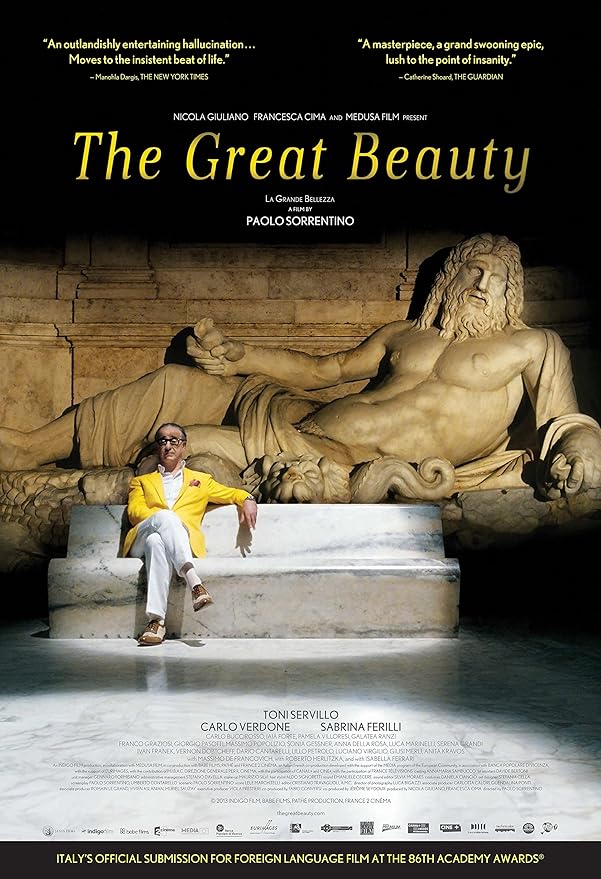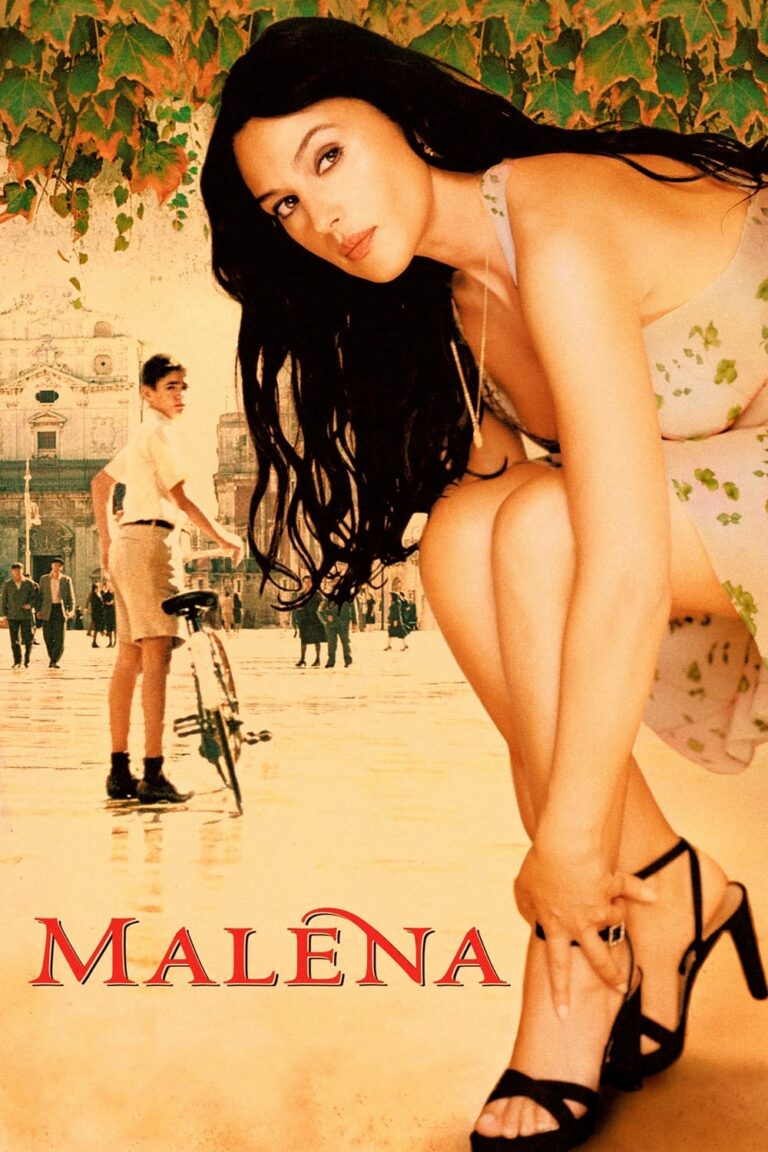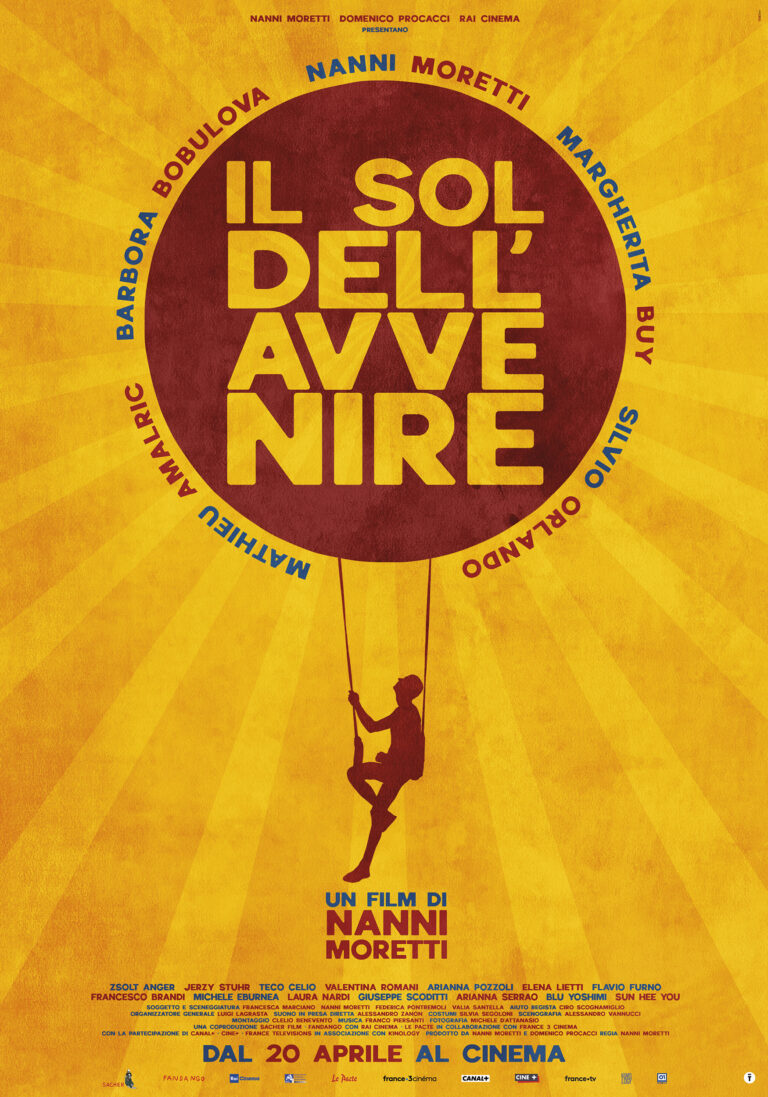
The Great Beauty (La grande bellezza), directed by Paolo Sorrentino and released in 2013, is a visually stunning and deeply introspective film that captures the essence of decadence, nostalgia, and existential longing. Set against the backdrop of Rome’s grandeur, the film serves as a meditation on life, art, and the fleeting nature of beauty. Hailed as a modern-day successor to Federico Fellini’s La Dolce Vita, it has cemented its place as one of the most significant films in contemporary cinema.
Introduction
The Great Beauty (La grande bellezza) is a cinematic masterpiece that captures the splendor and melancholy of modern Rome. With its stunning visuals, poetic storytelling, and masterful direction by Paolo Sorrentino, the film immerses viewers in the opulent yet hollow world of its protagonist, Jep Gambardella. A story about memory, art, and the search for meaning in an extravagant but transient existence, it resonates as a profound commentary on the human condition.
Plot Summary
The film follows Jep Gambardella (Toni Servillo), a 65-year-old journalist and one-time novelist who has become a prominent figure in Rome’s high-society circles. Celebrated for his charm and wit, Jep navigates a world of lavish parties, eccentric characters, and fleeting pleasures. Yet, beneath his confident facade lies a man grappling with unfulfilled dreams and the passage of time.
Jep’s 65th birthday marks a turning point as he begins to reflect on his past, including his lost love, Elisa, whose death reignites his longing for authenticity and meaning. As Jep roams Rome’s iconic streets, ruins, and opulent mansions, he encounters a cast of colorful characters, each representing facets of art, religion, and decadence. Through his journey, the film explores profound questions about beauty, mortality, and the search for purpose.
Paolo Sorrentino’s Vision
Sorrentino’s direction in The Great Beauty combines visual grandeur with philosophical depth. Inspired by Federico Fellini’s La Dolce Vita and Michelangelo Antonioni’s La Notte, Sorrentino captures the allure and absurdity of modern Rome, crafting a narrative that oscillates between satire and introspection.
Sorrentino’s Rome is a character in itself—a city that embodies timeless beauty yet is haunted by decay and emptiness. His signature use of long takes, sweeping camera movements, and vivid compositions creates an immersive experience that mirrors Jep’s internal journey.
Main Characters
- Jep Gambardella (Toni Servillo): The protagonist, a writer who has traded literary aspirations for a life of hedonism and social influence. Jep’s wit and charisma mask his existential despair.
- Ramona (Sabrina Ferilli): A stripper and Jep’s companion, who represents vulnerability and authenticity in his superficial world.
- Sister Maria (Giusi Merli): An elderly nun and symbol of spiritual purity, offering Jep a moment of clarity in his quest for meaning.
- Elisa (Annaluisa Capasa): Jep’s first love, whose memory becomes a source of introspection and regret.
Themes
1. Beauty and Decadence
The film juxtaposes the breathtaking beauty of Rome with the superficiality of its characters’ lives. It critiques a society consumed by excess and devoid of genuine substance.
2. Mortality and Time
Jep’s reflections on his past underscore the fleeting nature of life and the inevitability of aging. The film explores how people grapple with their mortality through art, memory, and escapism.
3. The Search for Meaning
Amidst the chaos of Rome’s nightlife and social rituals, Jep’s journey reveals a longing for authenticity and connection in a world driven by appearances.
Cinematography and Visual Style
The cinematography, helmed by Luca Bigazzi, is one of The Great Beauty’s standout elements. The film’s visuals transform Rome into a character that reflects Jep’s internal struggles. Iconic landmarks like the Colosseum, the Trevi Fountain, and hidden gardens serve as metaphors for the enduring allure and melancholy of the city.
Sorrentino’s use of vibrant colors and surreal imagery heightens the dreamlike quality of the narrative, creating a visual spectacle that immerses viewers in Jep’s perspective.
Cultural and Artistic References
The Great Beauty is steeped in Italian cultural and artistic history. From its parallels with Fellini’s La Dolce Vita to its references to classical art and contemporary performance pieces, the film pays homage to Rome’s legacy as a cultural epicenter. It also critiques the commodification of art and the shallow pursuits of modern society.
Reception and Critical Acclaim
Upon its release, The Great Beauty received widespread acclaim for its artistry and depth. It won the Academy Award for Best Foreign Language Film in 2014, along with a Golden Globe and a BAFTA in the same category. Critics praised Toni Servillo’s performance, Sorrentino’s direction, and the film’s rich thematic layers.
Comparison to La Dolce Vita
While The Great Beauty draws inspiration from La Dolce Vita, it offers a more introspective and melancholic take on similar themes. Where Fellini’s film captures the optimism and hedonism of post-war Italy, Sorrentino’s work reflects the disillusionment and existential malaise of contemporary society.
Music and Soundtrack
The film’s eclectic soundtrack, featuring classical compositions, choral music, and modern tracks, enhances its emotional resonance. Key pieces, such as “The Beatitudes” by Vladimir Martynov, evoke a spiritual and transcendent atmosphere that contrasts with the decadence of Jep’s world.
Philosophical Underpinnings
At its core, The Great Beauty is a philosophical exploration of what it means to live a meaningful life. Through Jep’s interactions and reflections, the film poses existential questions about identity, legacy, and the role of beauty in a transient world.
Legacy in Cinema
The Great Beauty has solidified its place as a modern classic, influencing filmmakers and resonating with audiences worldwide. Its timeless themes and stunning visuals ensure its continued relevance in discussions about art, life, and cinema.
FAQs
- What inspired Paolo Sorrentino to create The Great Beauty?
Sorrentino was inspired by the works of Federico Fellini and his own experiences in Rome, aiming to capture the city’s allure and contradictions. - Why is Rome significant in the film?
Rome serves as both a backdrop and a metaphor for beauty, decay, and the passage of time. - Is The Great Beauty a sequel to La Dolce Vita?
No, but it is often considered a spiritual successor due to its thematic and stylistic similarities. - What does the title The Great Beauty refer to?
It reflects the film’s exploration of beauty in art, life, and memory, as well as Jep’s quest to rediscover meaning. - Who wrote the screenplay?
Paolo Sorrentino co-wrote the screenplay with Umberto Contarello. - What awards did the film win?
The film won an Academy Award, Golden Globe, and BAFTA for Best Foreign Language Film, among other accolades.
Conclusion
The Great Beauty (La grande bellezza) is a cinematic triumph that captivates with its visual splendor and emotional depth. Paolo Sorrentino’s masterpiece invites viewers to reflect on life’s fleeting moments, the allure of beauty, and the pursuit of meaning. Through its richly layered narrative and unforgettable imagery, the film leaves an indelible mark on the hearts and minds of its audience.





